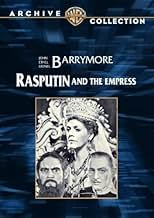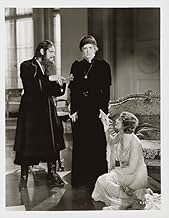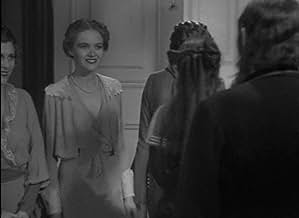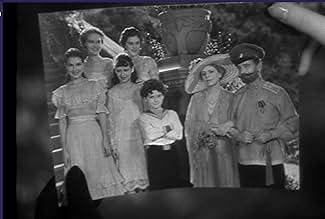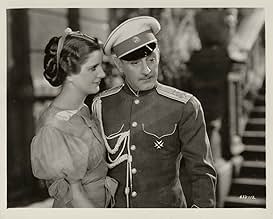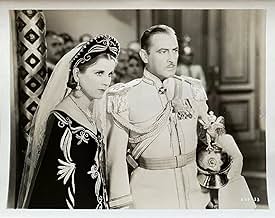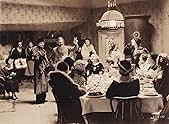IMDb-BEWERTUNG
6,5/10
1299
IHRE BEWERTUNG
Füge eine Handlung in deiner Sprache hinzuA prince plots to kill the mad monk Rasputin for the good of the czar, the czarina and Russia.A prince plots to kill the mad monk Rasputin for the good of the czar, the czarina and Russia.A prince plots to kill the mad monk Rasputin for the good of the czar, the czarina and Russia.
- Für 1 Oscar nominiert
- 4 Gewinne & 1 Nominierung insgesamt
Luis Alberni
- Photographer's Assistant
- (Nicht genannt)
Mary Alden
- Natasha's Lady in Waiting
- (Nicht genannt)
Robert Anderson
- Undetermined Secondary Role
- (Nicht genannt)
Oscar Apfel
- Undetermined Secondary Role
- (Nicht genannt)
Henry Armetta
- Photographer
- (Nicht genannt)
Hooper Atchley
- Rasputin's Henchman
- (Nicht genannt)
Mischa Auer
- Butler Pouring Drinks at Party
- (Nicht genannt)
Reginald Barlow
- General Who Underestimated the Japanese
- (Nicht genannt)
Barbara Barondess
- Woman Getting Cigarette
- (Nicht genannt)
Max Barwyn
- Bald Man Trying to See Duna
- (Nicht genannt)
Empfohlene Bewertungen
"Rasputin and the Empress" has the distinction of being the only movie that features siblings John, Ethel and Lionel Barrymore. However, of the three, Lionel is DEFINITELY the star and he's given ample opportunity to act and overact...and it's all very enjoyable to watch. His version of Rasputin certainly is NOT subtle.
Now there is a problem with making a film about Rasputin and that is there is a lot of lore involved. Many of the supposed 'facts' are obvious exaggerations....with the man having weird mystical powers and his death is clearly NOT realistically portrayed in history books. Fortunately, MGM chooses to make Rasputin evil but 100% human and without laser shooting out of his eyes!
The story begins in 1905, which is problematic since the film ends in mid-1918 with the murder of the Czar and his family. I say problematic because the children in the story never age! Additionally, although Rasputin had a personal relationship with the Czar and his family for about a decade, here in the film is looks like only a few months or perhaps a year. The fact is that the story wasn't intended as a history lesson and MGM made a few artistic changes here and there...something which probably made the film more enjoyable for most audience members.
As far as portraying this evil monk goes, Lionel Barrymore imbued him an amazing over-the-top personality and humanized him. Humanized because the tricks he does in the film are simply tricks--such as hypnotism and spying on folks in order to 'magically' know their secrets. It's all very enjoyable to watch and never is dull.
As for John, he has a relatively meaty role but is far, far more subdued. You do see him emote strongly during the murder sequence (one that varies tremendously with most accepted versions)....but otherwise he plays his role very straight.
Ethel, on the other hand, has a rather normal and even somewhat bland role in the movie. Simply put, any decent actress could have done her part.
So is it any good? Exceedingly so, yes. The story is never dull, is very big and exciting. And, even though they use a lot of stock footage, its inclusion isn't at all a detriment to the movie. Well worth seeing and quite enjoyable.
Now there is a problem with making a film about Rasputin and that is there is a lot of lore involved. Many of the supposed 'facts' are obvious exaggerations....with the man having weird mystical powers and his death is clearly NOT realistically portrayed in history books. Fortunately, MGM chooses to make Rasputin evil but 100% human and without laser shooting out of his eyes!
The story begins in 1905, which is problematic since the film ends in mid-1918 with the murder of the Czar and his family. I say problematic because the children in the story never age! Additionally, although Rasputin had a personal relationship with the Czar and his family for about a decade, here in the film is looks like only a few months or perhaps a year. The fact is that the story wasn't intended as a history lesson and MGM made a few artistic changes here and there...something which probably made the film more enjoyable for most audience members.
As far as portraying this evil monk goes, Lionel Barrymore imbued him an amazing over-the-top personality and humanized him. Humanized because the tricks he does in the film are simply tricks--such as hypnotism and spying on folks in order to 'magically' know their secrets. It's all very enjoyable to watch and never is dull.
As for John, he has a relatively meaty role but is far, far more subdued. You do see him emote strongly during the murder sequence (one that varies tremendously with most accepted versions)....but otherwise he plays his role very straight.
Ethel, on the other hand, has a rather normal and even somewhat bland role in the movie. Simply put, any decent actress could have done her part.
So is it any good? Exceedingly so, yes. The story is never dull, is very big and exciting. And, even though they use a lot of stock footage, its inclusion isn't at all a detriment to the movie. Well worth seeing and quite enjoyable.
Rasputin and the Empress (1932)
*** (out of 4)
Lionel, John and Ethel Barrymore star in this film, which was the only one that all three legends appeared in together. After her son is near death, Czarina Alexandria (Ethel) lets the monk Rasputin (Lionel) pray with her son who eventually heals and the monk gives credit to God. Saving her son, the monk soon finds himself gaining power inside the government but this doesn't sit well with Prince Chegodieff (John) who will stop at nothing to prove the monk is mad. Apparently MGM was sued due to how inaccurate the story is here so if you want a history lesson you should go read a book but if you want to see all three Barrymore's together then this is the only film out there that will suit you. The film should have been a lot better than it is but the thing drags at several points and I'm sure fifteen or so minutes could have been trimmed from the 123-minute running time, although apparently the film ran longer when originally released. The performances aren't what you'd expect but it's certainly fun seeing the three Barrymore's working together. Lionel actually goes way over the top, which is something you'd expect from John but he actually manages to be quite calm and cool throughout the film. John certainly gives the best performance but it's Lionel who steals the film with his fake beard and over the top antics. Ethel is good in her role as is the supporting work from Ralph Morgan. The costumes and set design are wonderful and I really enjoyed the made up ending, which contains some pretty strong violence.
*** (out of 4)
Lionel, John and Ethel Barrymore star in this film, which was the only one that all three legends appeared in together. After her son is near death, Czarina Alexandria (Ethel) lets the monk Rasputin (Lionel) pray with her son who eventually heals and the monk gives credit to God. Saving her son, the monk soon finds himself gaining power inside the government but this doesn't sit well with Prince Chegodieff (John) who will stop at nothing to prove the monk is mad. Apparently MGM was sued due to how inaccurate the story is here so if you want a history lesson you should go read a book but if you want to see all three Barrymore's together then this is the only film out there that will suit you. The film should have been a lot better than it is but the thing drags at several points and I'm sure fifteen or so minutes could have been trimmed from the 123-minute running time, although apparently the film ran longer when originally released. The performances aren't what you'd expect but it's certainly fun seeing the three Barrymore's working together. Lionel actually goes way over the top, which is something you'd expect from John but he actually manages to be quite calm and cool throughout the film. John certainly gives the best performance but it's Lionel who steals the film with his fake beard and over the top antics. Ethel is good in her role as is the supporting work from Ralph Morgan. The costumes and set design are wonderful and I really enjoyed the made up ending, which contains some pretty strong violence.
This is a reasonably decent movie, well acted (particularly by Lionel, who practically chews the scenery as Rasputin) and the sets and costumes are fairly nice. But the main selling point is that this is the only time the three Barrymores -Ethel, John and Lionel did a movie together. It's a good movie but could have been much better.
The only film with all three Barrymores together and it's a good film, however, the direction is very poorly done, especially the ending scene.
Other than that, Lionel Barrymore portrays an excellent Rasputin and Ethel Barrymore is wonderful as the Empress Alexandra Fyodorovna. John Barrymore is great as Prince Paul, the assassin of Rasputin (in real life, it was Prince Yussupov who assassinated Rasputin).
This is a good film, but if you want a better interpretation of Rasputin's "reign," rent the 1996 HBO version with Alan Rickman or the 1971 movie, "Nicholas and Alexandra."
Other than that, Lionel Barrymore portrays an excellent Rasputin and Ethel Barrymore is wonderful as the Empress Alexandra Fyodorovna. John Barrymore is great as Prince Paul, the assassin of Rasputin (in real life, it was Prince Yussupov who assassinated Rasputin).
This is a good film, but if you want a better interpretation of Rasputin's "reign," rent the 1996 HBO version with Alan Rickman or the 1971 movie, "Nicholas and Alexandra."
By now, everyone - but everyone - has commented on what bad history this movie is. Fine, I won't argue the point. But, what about it as drama? In my opinion, this is one of the most powerful tales of tragedy of it's time. ( This is particularly noteworthy given MGM's later penchant for frivolousness. ) Part of it has do do with the sincerity and conviction of the story. [ Alhough Charles MacArtur and others are given credit for the screenplay, I believe the original story - I have read a copy of the book - was written by a Russian émigré who fled the revolution. Unfortunately, I am presently unable to locate my copy. ] Nonetheless, this would go a long way towards explaining the movie's passion.
As for the acting; it features an outstanding cast, including the three Barrymores, as well as an assemblage of first rate supporting actors of the time. ( Anyone notice Edwarld Arnold as Dr. Remezov? ) Of course, much of it seems dated by today's standards. ( This was 1932, after all. ) Keep in mind that this is high melodrama. In that context, Lionel Barrymore exudes pure evil as the scheming, mad monk. He also brings out the crudity and vulgarity of the man, which generally jibes with historical accounts. Just try not to dwell on the fake beard.
John is fine and properly earnest as Prince Chegodieff, although his performance does seem a bit old-fashioned next to Lionel's. He really lets it all hang out in the murder scene, however. Ethel seems a trifle stiff, but Ralph Morgan is just right as Nicholas. In fact, sincerity and seriousness of purpose seem to be the hallmarks of the entire ensemble. And through it all, there is this sense of tragic inevitability; of events that, once set in motion, cannot be reversed.
One other thing that warrants a mention is the music. The Russian Orthodox liturgical music used in the celebratory scene near the beginning is moving and powerful. It could well put one in mind of the the wedding scene in Michael Cimino's "The Deer Hunter" ( 1978 ). Later, there is a medley of martial music, accompanied by historical footage, as Russia mobilizes for The Great War. Here we hear "God Save the Tsar", a tune which Mikhail Glinka featured in his opera, "A Life for the Tsar", but which was routinely banned during Soviet performances. All in all, exciting stuff.
This is a movie well worth watching, historical accuracy notwithstanding.
As for the acting; it features an outstanding cast, including the three Barrymores, as well as an assemblage of first rate supporting actors of the time. ( Anyone notice Edwarld Arnold as Dr. Remezov? ) Of course, much of it seems dated by today's standards. ( This was 1932, after all. ) Keep in mind that this is high melodrama. In that context, Lionel Barrymore exudes pure evil as the scheming, mad monk. He also brings out the crudity and vulgarity of the man, which generally jibes with historical accounts. Just try not to dwell on the fake beard.
John is fine and properly earnest as Prince Chegodieff, although his performance does seem a bit old-fashioned next to Lionel's. He really lets it all hang out in the murder scene, however. Ethel seems a trifle stiff, but Ralph Morgan is just right as Nicholas. In fact, sincerity and seriousness of purpose seem to be the hallmarks of the entire ensemble. And through it all, there is this sense of tragic inevitability; of events that, once set in motion, cannot be reversed.
One other thing that warrants a mention is the music. The Russian Orthodox liturgical music used in the celebratory scene near the beginning is moving and powerful. It could well put one in mind of the the wedding scene in Michael Cimino's "The Deer Hunter" ( 1978 ). Later, there is a medley of martial music, accompanied by historical footage, as Russia mobilizes for The Great War. Here we hear "God Save the Tsar", a tune which Mikhail Glinka featured in his opera, "A Life for the Tsar", but which was routinely banned during Soviet performances. All in all, exciting stuff.
This is a movie well worth watching, historical accuracy notwithstanding.
Wusstest du schon
- WissenswertesAnnoyed that his brother John Barrymore was trying to show him up by placing his hand on him while he was finishing a scene (an ancient actor's technique for drawing attention to oneself), Lionel Barrymore excused himself from the set and went to the back lot to find a telephone. He then phoned the set and told director Richard Boleslawski that "he'd better advise Mr. John Barrymore to not place his hand on me at the close of this scene, lest I lay one on him!" By the time Lionel returned to the set, John has been advised to keep his hands to himself.
- PatzerThe fact that the Tsarevich was sick was not announced publicly as portrayed in the movie. It was kept a secret.
- Zitate
Natasha: You don't like him because he's so outspoken. You don't like his manners. Isn't that it?
Prince Chegodieff: No, that's not it. It, its his, smile. It's like a man-eating shark with a bible under his fin.
- Alternative VersionenUpon its premiere "Rasputin and the Empress" ran approximately 132 minutes. Due to the famous lawsuits against it, a number of scenes had to be cut for legal reasons. One critical scene that was deleted was one which implied that Rasputin had raped Diana Wynyard's character of "Princess Natascha". The removal of this scene tended to make the character of Princess Natascha somewhat incomprehensible - initially she is a supporter of Rasputin; in the latter part of the film she is very afraid of him. Unless the viewer is aware of the cuts made in the film, there does not appear to be any explanation for the change in Princess Natascha toward Rasputin.
- VerbindungenFeatured in Biography: The Barrymores (2002)
- SoundtracksRussian National Anthem
(uncredited)
[Played during the opening credits and at the end]
Top-Auswahl
Melde dich zum Bewerten an und greife auf die Watchlist für personalisierte Empfehlungen zu.
- How long is Rasputin and the Empress?Powered by Alexa
Details
- Erscheinungsdatum
- Herkunftsland
- Sprachen
- Auch bekannt als
- Rasputin and the Empress
- Drehorte
- Sankt Petersburg, Russland(archive footage)
- Produktionsfirma
- Weitere beteiligte Unternehmen bei IMDbPro anzeigen
Box Office
- Budget
- 1.022.000 $ (geschätzt)
- Laufzeit
- 2 Std. 1 Min.(121 min)
- Farbe
- Seitenverhältnis
- 1.37 : 1
Zu dieser Seite beitragen
Bearbeitung vorschlagen oder fehlenden Inhalt hinzufügen

